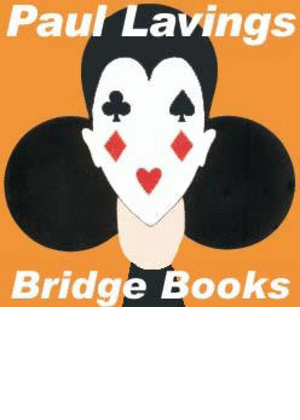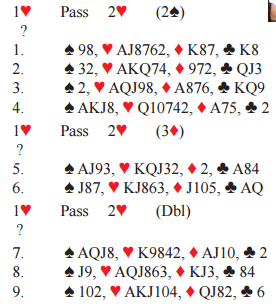Source: ABF Newsletter May 2014

What do you call, nil vulnerable, in the following auctions:

Solutions:
⇓
⇓
⇓
⇓
⇓
⇓
⇓
⇓
⇓
⇓
⇓
⇓
⇓
⇓
1. 3![]() . With a six-card suit, you should always bid 3
. With a six-card suit, you should always bid 3![]() in this auction. Do not be concerned with pushing opponents to game; if they go to game they could well fail, everyone is guessing at this stage. You are simply following the Law of Total Tricks by bidding to the three-level when your side has nine trumps. If you pass over 2
in this auction. Do not be concerned with pushing opponents to game; if they go to game they could well fail, everyone is guessing at this stage. You are simply following the Law of Total Tricks by bidding to the three-level when your side has nine trumps. If you pass over 2![]() you allow the overcaller’s partner two ways of raising spades; 3
you allow the overcaller’s partner two ways of raising spades; 3![]() , a mild raise, and 3
, a mild raise, and 3![]() , a maximum raise. By consuming space you make the exchange of accurate information more difficult for the opposition.
, a maximum raise. By consuming space you make the exchange of accurate information more difficult for the opposition.
2. 3![]() . Your hand is very concentrated, with strong trumps and honours working in unison. Sure, it could be wrong to bid 3
. Your hand is very concentrated, with strong trumps and honours working in unison. Sure, it could be wrong to bid 3![]() , but you have many ways to gain. At pairs you give opponents the last guess as to whether to pass 3
, but you have many ways to gain. At pairs you give opponents the last guess as to whether to pass 3![]() , bid 3
, bid 3![]() or 4
or 4![]() , or double 3
, or double 3![]() . At IMPs you gain 2 IMPs when 2
. At IMPs you gain 2 IMPs when 2![]() makes +110 and 3
makes +110 and 3![]() fails, and 3 IMPs when 2
fails, and 3 IMPs when 2![]() makes +140 and 3
makes +140 and 3![]() fails. On this hand from the last round of the recent Australian Seniors Team Playoffs, 3
fails. On this hand from the last round of the recent Australian Seniors Team Playoffs, 3![]() makes for +140, and 2
makes for +140, and 2![]() also makes for -110, so you are 6 IMPs better off by bidding 3
also makes for -110, so you are 6 IMPs better off by bidding 3![]() .
.
3. 3![]() . A normal long suit game try, at least a three-card suit. You want responder to bid 4
. A normal long suit game try, at least a three-card suit. You want responder to bid 4![]() with values in diamonds, or to sign off in 3
with values in diamonds, or to sign off in 3![]() with an unsuitable hand.
with an unsuitable hand.
4. Dbl. A penalty double, with strength in spades. You can probably take five tricks against spades, and partner has 6-10 HCP. Your partner doesn’t have to pass, but your double will serve as a strong warning not to bid 3![]() . If you choose to play this double as shortage in spades that will also work: you simply pass, and pass again when partner doubles with a spade shortage.
. If you choose to play this double as shortage in spades that will also work: you simply pass, and pass again when partner doubles with a spade shortage.
5. Dbl. You would like to make a game try bid in spades, but you have no space to do so. Double here is a “Maximal Double”, a general game try where there is no space to make a natural game try. It would be a mistake to simply bid 3![]() , as this is competitive only, and in no way invitational. Note that if the overcall were 3
, as this is competitive only, and in no way invitational. Note that if the overcall were 3![]() , then 3
, then 3![]() would be the only game try available, and that would also be a general game try, not relating to diamonds.
would be the only game try available, and that would also be a general game try, not relating to diamonds.
6. Pass. Your hand is a minimum and all defence, with honours in short suits and three cards in their suit. Those stray jacks are unlikely.
7. Rdbl. Redouble says “Partner, double them if you can”. You can double spades or diamonds, so alert your partner to double clubs. Low level penalties can be a source of grief and frustration, but when you start to get the defences right they become a source of riches and joy. Here you could easily pick up +500 by doubling them, with 4![]() not making. Plus you want your opponents to know you are prepared to double them if they step over the line, so they will be less eager in competitive auctions.
not making. Plus you want your opponents to know you are prepared to double them if they step over the line, so they will be less eager in competitive auctions.
8. 3![]() . Automatic, your best chance to interfere with the opponent’s lines of communication is to bid now. You can then be secure in the fact that you have made life as difficult as possible for them.
. Automatic, your best chance to interfere with the opponent’s lines of communication is to bid now. You can then be secure in the fact that you have made life as difficult as possible for them.
9. 3![]() . You don’t have a six-card suit, but you are low on defence, and want to make life as difficult for the opposition as possible. If you pass, your LHO has a jump to 3
. You don’t have a six-card suit, but you are low on defence, and want to make life as difficult for the opposition as possible. If you pass, your LHO has a jump to 3![]() available as a strong invitation, but when you bid 3
available as a strong invitation, but when you bid 3![]() the 3
the 3![]() bid is now competitive.
bid is now competitive.
